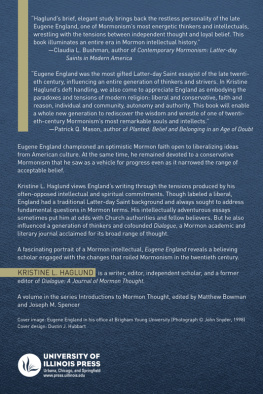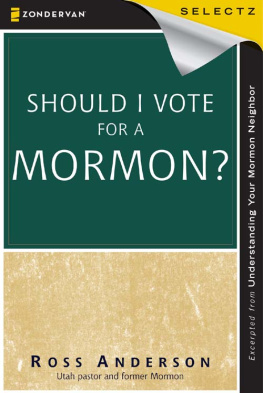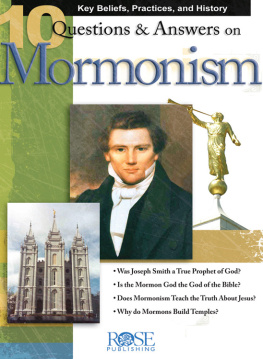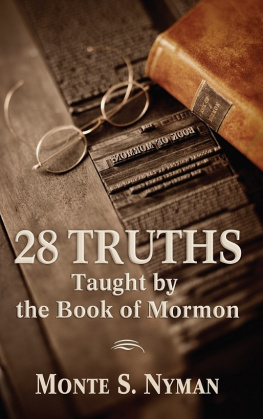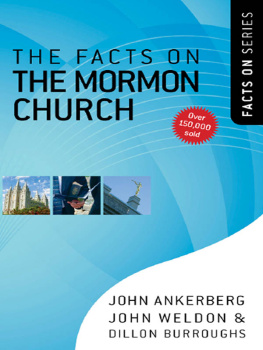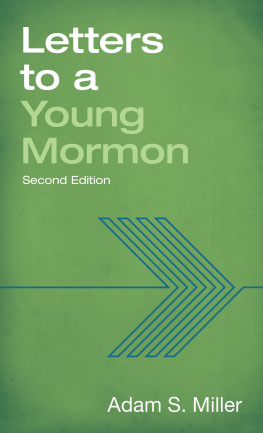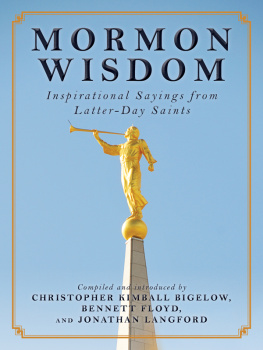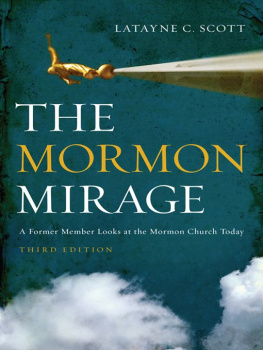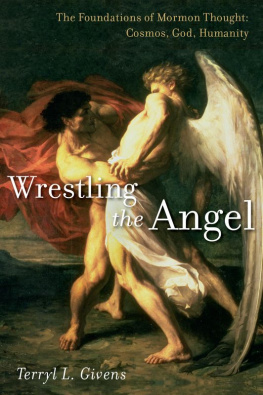Contents
CHAPTER 1
Eugene England
A Life
Prologue: 1933
Eugene England was born in 1933, both ahead of his time, and having just missed it. He was ahead of his time, because his emphasis on the pragmatic goodness of Mormonism and the possibility of mustering Mormon theological resources in the service of progressive politics might appeal to many contemporary young Mormons, and because the kind of openness and dialogue that he hoped and worked for has subtly influenced the churchs bureaucracy. He also missed his time; he might have been more at home in the early twentieth-century Mormonism that was shaped by progressive intellectuals like James E. Talmage and B. H. Roberts, who both died in the year he was born. The expansive version of Mormonism that appealed to England was being eclipsed even before he began to articulate it for his own generation of Latter-day Saints.
England had a childhood typical of Mormons in the first part of the twentieth century, and his life unfolded in a pattern that paralleled changes in Mormon life: he left the Mormon homeland in the intermountain West for missionary service, education, military service, and professional opportunities, then returned, bringing new ideas and working to assimilate them into the faith of his youth. He became an influential teacher at Brigham Young University and a champion of Mormon literature. His writings, especially his personal essays, influenced a generation of thoughtful Mormons and the academic and literary journal he cofounded, Dialogue: A Journal of Mormon Thought, has been a forum for and a record of Mormon intellectuals grappling with the questions that the encounter with secular modernity pressed upon Mormons in the latter half of the twentieth century. Englands life and thought are intriguing not only in their own right, but also for what they show about the contours of twentieth-century Mormonism.
As he confronted the issues of his time, England pulled at various threads from the homespun cloth of Mormonisms complex and sometimes self-contradictory doctrine. Questions about the nature of God, the status of scripture, the relative power of authoritative discourse and personal conscience, the comparative epistemological weight of science and faith, and the role of religious belief in the public sphere were all questions that England tried to address in Mormon terms, even when his answers put him at odds with church authorities and other believers. But he also imported terminology from American cultural and political discourse to discussions of church doctrine and ecclesiology. This, too, is quintessentially Mormonthe collapse of social, political, and ecclesiastical worlds has been a frequently criticized and occasionally celebrated feature of Mormonism.
In a speech to the English Department faculty at BYU near the end of his life, England began by mentioning two formative experiences that had convinced him of the reality of Jesus Christs saving mission and of the divine authority of the leaders of the Church of Jesus Christ of Latter-day Saints. The result of those experiences, he said, was that he became both liberal and conservative. His conviction of and devotion to Jesus opened his mind and heart to causes he categorized as liberalequal consumption of world resources, justice for minority or dispossessed peoples, opposition to all wars. His certainty about the divine authority vested in Mormon prophets and apostles made him conservative, he said, although his definition of conservative might not have been what his audience expected: a firm, conservative confidence in the church and its leaders as well as the gospel, such that I have never felt any need to avoid difficult issues or to simply accept culturally prescribed boundaries. I have felt able to explore our history without fear, to examine troubling questions of doctrine and Church practice, to face squarely the humanness of our leaders.
He was conservative in cultural ways, too. He enlisted in the ROTC and spent several years in the air force; he married young and was devoted to his wife and six children; he was registered as a Republican for most of his life; and he was a devout and actively practicing member of the LDS Church for his entire life. But, during his life and after his death, almost everyone has described him as a liberal Mormon. In part, this has to do with the way that American religions aligned themselves politically in the 1970s and 1980s, so that Englands political engagement in secular liberal causes was the most salient identifier for other Mormons. But Mormon usage of conservative and liberal means something in religious terms that doesnt neatly map onto American political or theological categories, and Eugene Englands life was lived at the temporal and geographical center of the widening cultural divide.
Theologically, of course, there has never been any such thing as a Mormon liberal, at least not in the ways that most scholars of Christianity have applied the term. Talmage and Roberts were liberal in a quite narrow sense that had more to do with a general openness to modernity and an approach to religion that valorized the human capacity for reason in understanding the things of God rather than with the kinds of scriptural criticism and the historicized Jesus that came to be called liberal in other Christian denominations.
Mormonism has no doctrine of inerrancy, and indeed allows an open canon, with three books of scripture in addition to the Bible as the Standard Works, and yet most lay Mormon discourse is grounded in a quite literalist scriptural hermeneutic. There is no Mormon doctrine of infallibility, and yet in practice, extreme deference is accorded to authoritative pronouncements, especially those from the highest level of the church hierarchy (the First Presidency and the Quorum of the Twelve Apostles), but even to the opinions of local lay leaders. Most importantly, Mormonism has no real mechanism for authorizing a unitary theological interpretation, and no seminaries or training programs for its mostly lay clergy, so that what is considered authoritative doctrine varies widely, and Mormons with significantly divergent beliefs may consider themselves perfectly orthodox. Moreover, Mormon scripture valorizes individual intellectual effort as salvific: if a person acquires more knowledge and intelligence in this life through his diligence and obedience than another, he will have so much the advantage in the world to come. Early Mormonism was optimistic about scientific progress, and regarded scientific discovery as similar to religious revelation as a means for human beings to come to understand the mind of God.
This emphasis on personal intellectual striving corresponded, perhaps surprisingly, with a consistently conservative ecclesiology characterized by a strong centralized authority. Mormons endured serious conflict with their American neighbors and government in the nineteenth century, and this conflict was often initiated or intensified by dissent from within. Thus loyalty and unity became primary organizational and psychological values, if not theological ones. In the Mormon struggle to belong in America, there were never clear demarcations between religious, ideological, and political strife; institutional hypervigilance could trigger fiercely defensive reactions over apparently minor disagreements. And because there was no ecclesiastical mechanism for adjudicating the fundamental theological questions at issue, doctrinal conflict became personalizedoccasionally there were ecclesiastical sanctions for dissenters within the church, but more often, disputes over the authority to pronounce doctrine played out in ad hoc silencing or ostracization of people who taught controversial ideas like evolution or higher criticism. However, their ideas were often not officially repudiated, and so the next generation confronted the most difficult questions again, and different ideas dominated different eras. Besides Robertss and Talmages deaths, the year of Englands birth marks the beginning of J. Reuben Clarks ascent through the central church hierarchy. Clark, an attorney and civil servant with a forceful personality, conservative politics, and religious views that tended toward fundamentalism, was called as a counselor to President Heber J. Grant in 1933. He was ordained an apostle a year later, and over the nearly three decades he served, the Quorum increasingly comprised men like Joseph Fielding Smith Jr., Ezra Taft Benson, Mark E. Peterson, and Harold B. Lee, who had more absolutist views of God, more literalist views about scripture, and less friendly attitudes toward science than their predecessors like Roberts, Talmage, and John A. Widtsoe.

